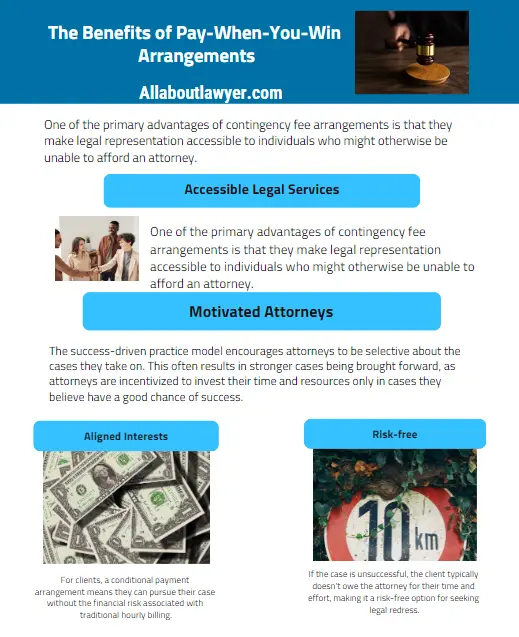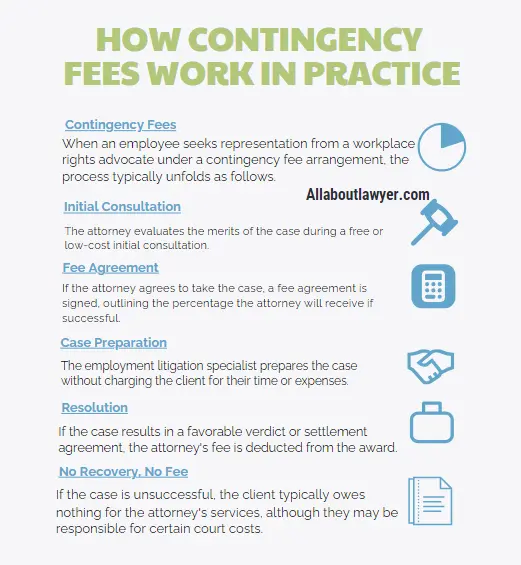No-Win No-Fee Employment Lawyers
In the complex world of employment law, Handling workplace disputes can be a daunting task for employees. One of the most significant barriers to look for legal representation is often the fear of hefty legal fees. However, a solution exists that aligns the interests of both the client and the attorney: the concept of “pay when you win” or contingency fee arrangements. This article delves deep into the intricacies of Employment lawyer pay when you win payment structure, its benefits, potential drawbacks, and what it means for both employees seeking justice and the attorneys who represent them.
Table of Contents
What is a Contingency Fee Arrangement?
A contingency fee arrangement, often referred to as “no-win no-fee” or “success-based compensation,” is a payment structure where the employment lawyer only receives payment if they secure a favorable outcome for their client. This outcome-based fee structure has revolutionized access to legal services, particularly in the field of employment law.
Under this model, the labor law attorney agrees to represent the client without upfront fees. Instead, they take a percentage of the settlement or court award if the case is successful. This percentage-based fee is typically agreed upon at the outset of the representation and can vary depending on the complexity of the case and the potential recovery amount.
The Benefits of Pay-When-You-Win Arrangements
1. Accessible Legal Services
One of the primary advantages of contingency fee arrangements is that they make legal representation accessible to individuals who might otherwise be unable to afford an attorney. This is particularly crucial in employment cases, where workers may have lost their job or are facing financial hardship due to workplace issues.

2. Aligned Interests
When an employment litigation specialist works on a contingency basis, their interests are directly aligned with those of their client. The attorney only gets paid if they secure a positive case resolution, whether through a favorable verdict or a settlement agreement. This incentivized legal counsel model ensures that the attorney is motivated to achieve the best possible outcome for their client.
3. Risk-Free Representation
For clients, a conditional payment arrangement means they can pursue their case without the financial risk associated with traditional hourly billing. If the case is unsuccessful, the client typically doesn’t owe the attorney for their time and effort, making it a risk-free option for seeking legal redress.
4. Motivated Attorneys
The success-driven practice model encourages attorneys to be selective about the cases they take on. This often results in stronger cases being brought forward, as attorneys are incentivized to invest their time and resources only in cases they believe have a good chance of success.
Types of Cases Suitable for Contingency Arrangements (Pay When You Win)
While not all employment law cases are suitable for contingency fee arrangements, many common workplace disputes can be handled under this model. Some of the most frequent case types include:
1. Wrongful Termination Suits
When an employee believes they have been fired for illegal reasons, such as discrimination or retaliation, a wrongful termination suit may be appropriate. These cases often lend themselves well to contingency fee arrangements due to the potential for significant damages.
2. Discrimination Claims
Cases involving workplace discrimination based on protected characteristics like race, gender, age, or disability are frequently handled on a contingency basis. These claims can be complex and time-consuming, making them suitable for performance-linked remuneration structures.
3. Harassment Lawsuits
Sexual harassment and other forms of workplace harassment can have severe impacts on employees. Contingency fee arrangements allow victims to seek justice without the added stress of upfront legal costs.
4. Wage and Hour Disputes
Claims involving unpaid overtime, minimum wage violations, or misclassification of employees are often well-suited to contingency fee arrangements, particularly when they involve multiple employees or significant back pay.
How Contingency Fees Work in Practice Of Pay When You Win
When an employee seeks representation from a workplace rights advocate under a contingency fee arrangement, the process typically unfolds as follows:
1. Initial Consultation: The attorney evaluates the merits of the case during a free or low-cost initial consultation.
2. Fee Agreement: If the attorney agrees to take the case, a fee agreement is signed, outlining the percentage the attorney will receive if successful.
3. Case Preparation: The employment litigation specialist prepares the case without charging the client for their time or expenses.
4. Resolution: If the case results in a favorable verdict or settlement agreement, the attorney’s fee is deducted from the award.
5. No Recovery, No Fee: If the case is unsuccessful, the client typically owes nothing for the attorney’s services, although they may be responsible for certain court costs.

Potential Drawbacks and Considerations Of Pay When You Win Lawyer
While contingency fee arrangements offer many benefits, it’s important to consider potential drawbacks:
1. Higher Percentage Fees:
Because attorneys are taking on the risk of non-payment, contingency fees are often higher than traditional hourly rates when calculated as a percentage of the recovery.
2. Case Selectivity:
Attorneys may be more selective about the cases they take on, potentially leaving some valid but lower-value claims without representation.
3. Potential Conflicts:
In some cases, there may be a conflict between the client’s desire for a quick settlement and the attorney’s interest in pursuing a larger award.
4. Limited Scope:
Not all employment law matters are suitable for contingency arrangements, particularly those involving primarily injunctive relief or where damages are difficult to quantify.
The Impact on the Legal Industry Of Pay When You Win Employment Lawyer
The rise of contingency fee arrangements has had a significant impact on the practice of employment law:
1. Increased Access to Justice: By removing financial barriers, more employees can seek legal redress for workplace violations.
2. Shift in Case Selection: Attorneys are incentivized to take on stronger cases, potentially leading to more impactful litigation and precedent-setting decisions.
3. Evolution of Law Firms: Many firms have adapted their business models to accommodate contingency fee cases, often balancing them with traditional hourly billing matters.
4. Enhanced Negotiation Power: The willingness of an attorney to take a case on contingency can signal to employers the strength of the employee’s claim, potentially leading to more favorable settlement offers.
Ethical Considerations and Regulations
While contingency fee arrangements are widely accepted in employment law, they are subject to ethical rules and regulations:
1. Fee Caps: Some jurisdictions impose caps on the percentage that attorneys can charge in contingency cases.
2. Clear Communication: Attorneys are required to clearly explain the fee structure and ensure clients understand the terms of the agreement.
3. Prohibited Cases: Certain types of cases, such as criminal defense, are generally not allowed to be handled on a contingency basis.
4. Expense Responsibility: The agreement should clearly outline who is responsible for case-related expenses, regardless of the outcome.
Conclusion
The “pay when you win” model in employment law has transformed the landscape of workplace justice advocacy. By aligning the interests of attorneys with their clients and removing financial barriers to representation, contingency fee arrangements have made fair employment practices more achievable for many workers.
While this model is not without its challenges and limitations, it represents a significant step toward ensuring that all employees, regardless of their financial situation, have access to legal representation when facing workplace injustices. As the legal industry continues to evolve, the success-driven practice model of contingency fees is likely to remain a crucial component of employment law, fostering a more equitable and accessible legal system for workers across all sectors.
Related Articles For You:
Should I Need To Have a Lawyer To Review My Employment Contract?
FAQs
1. What percentage do employment lawyers typically charge on contingency?
Employment lawyers typically charge between 30% to 40% of the recovery amount in contingency cases. However, this can vary based on case complexity and potential recovery size.
2. Can I still get a lawyer if I can’t afford to pay upfront?
Yes, many employment lawyers offer contingency fee arrangements where you only pay if you win your case, making legal representation accessible even if you can’t afford upfront fees.
3. What types of employment cases are usually taken on contingency?
Common cases taken on contingency include wrongful termination, discrimination, harassment, and wage and hour disputes. Cases with clear damages and strong evidence are more likely to be accepted.
4. Do I have to pay anything if I lose my case?
In most contingency arrangements, you don’t pay attorney fees if you lose. However, you may still be responsible for certain court costs and expenses, which should be clearly outlined in your agreement.
5. How long does an employment lawsuit typically take?
The duration of an employment lawsuit can vary widely, from a few months to several years, depending on the case’s complexity and whether it settles or goes to trial.
Don’t forget to visit All About Lawyer for more articles.
About the Author

Sarah Klein, JD, is a former employment attorney who has advised clients on wrongful termination, workplace discrimination, wage disputes, and employee rights. At All About Lawyer, she writes practical, legally sound guides to help workers understand labor laws and stand up for fair treatment at work.
Read more about Sarah
